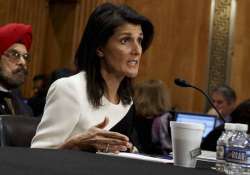South Carolina Governor Nikki Haley, Donald Trump's pick for US ambassador to the United Nations, has called for reforming the United Nations and especially the peacekeeping operations.
At the same time, Haley declared she will be a ‘voice of freedom’ and strongly articulate the US position and bring a firm message to the world body.
The first Indian American to be nominated to a cabinet-level, Haley appeared before the Senate Foreign Relations Committee with her father, Ajit Singh Randhawa, wearing a red turban seated behind her.
Committee Chairman Bob Corker introduced her saying that her's was a ‘compelling story of a family's pursuit of the American Dream’.
Corker and Haley, as well as other senators, noted her family's participation -- her husband, Michael Haley, and her brother, Mitti -- in the military as combat veterans.
Although there were references to the South Carolina Governor's lack of foreign policy experience, her hearing was smooth and an acknowledgment that she could transfer her influence-building skills and developing consensus as a Governor.
Haley said that she will be able to bring a fresh set of eyes to the UN.
On UN peacekeeping she wanted more nations to get actively involved, saying: "They should have a skin in the game."
She noted that the US paid 29 per cent of the peacekeeping bill and if other countries contributed more they will take more interest to ensure the efficiency of the operations and reforms would be easier.
Haley said that all the 16 peacekeeping operations should be re-examined and a major criterion for launching such operations should be if they can be viable. The peacekeepers should be able to stabilise a country or a situation and get out, she said.
She appeared to favour a position that the South Sudan operations, where India has more than 2,200 peacekeepers, can be ended because the government there was against the operations and, therefore, can’t be effective.
The US has primary responsibility for South Sudan at the Security Council.
The Governor spoke out strongly about the sexual abuse and exploitation carried out by peacekeepers and said that countries that do not take action against the erring soldiers should be thrown out of peacekeeping.
Haley said that she would selectively use the funding power of the US at the UN, while she was against a "slash and burn" policy of cutting of all funding.
For example, she said, the US could withhold funds for the UN Human Rights Council where China, Cuba and other rights violators have a place.
Corker said at the end of the hearing that he was certain the Senate will approve her nomination. She has impressed everyone and they trusted her instincts, he added.
Haley acknowledges differences with Trump on Russia
Questioned about Trump's world view by Senators during the hearing that is a prelude to a vote by the whole Senate confirming her appointment, Haley acknowledged her differences with him on issues like attitude to Russia.
Haley said that she will not be a 'yes-person' and will challenge him (Trump) when necessary, adding that she found him open to differing opinions.
She also said that Trump is likely to change his views on some matters when he interacts with the National Security Council that will present him with a broader picture.
The hearing was dominated by Israel and Russia and at sometimes sounded like a throwback to the 1950s at the height of the cold war, except there was a marked deference to China.
Russia, despite the differences with it on major issues and problems with its role in certain areas, can work with the US on countering the Islamic State, she said.
With Agency Inputs
Latest World News
